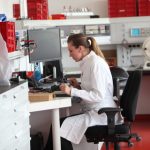
Funding to develop next generation of AI leaders
Swansea University has been awarded funding from the UK Government to create one of sixteen new Centres for Doctoral Training (CDTs) in Artificial Intelligence. It is part of a £100m investment by UK Research and Innovation (UKRI) aimed at enabling a new generation of PhD students to use AI technology to improve healthcare, tackle climate … Continue reading Funding to develop next generation of AI leaders

Research to improve the diagnosis of of colorectal cancer
Current faecal blood tests for colorectal cancer have a 60% false positive rate. New funding from Cancer Research UK is helping scientists at Cardiff University to find better, safer tests. Inaccuracy of initial tests for colorectal cancer are putting patients at unnecessary risk, highlighting vital need for the development of precise and non-invasive testing. Cardiff … Continue reading Research to improve the diagnosis of of colorectal cancer

Funding to improve pancreatic cancer survival rates
Over £370,000 has been awarded to Dr Catherine Hogan at Cardiff University’s European Cancer Stem Cell Research Institute to help find new targets for early detection of pancreatic cancer. Cardiff University says the funding, from Cancer Research UK Early Detection Committee, will support investigation into the underlying mechanisms of early disease, with the aim of … Continue reading Funding to improve pancreatic cancer survival rates

Intensive therapy better for early stage multiple sclerosis
New findings by researchers at Cardiff University suggest intensive therapy during the early stages of multiple sclerosis (MS) leads to better long-term outcomes, despite it often being viewed as a riskier option than other first line treatments. Cardiff University reports Dr Emma Tallantyre, from its Division of Psychological Medicine and Clinical Neurosciences, said “Over the … Continue reading Intensive therapy better for early stage multiple sclerosis

Seeing the unseeable to learn how viruses bind cells
Researchers at Cardiff University have used x-ray crystallography and computer simulation to get a closer look at how viruses bind cells and cause infection. Cardiff University says the new insight could help in the development of drugs and therapies for infections and further advance the exploitation of viruses for medical treatments. The first author of … Continue reading Seeing the unseeable to learn how viruses bind cells

Cardiff University becomes latest partner in BrainsCAN
Cardiff University has become the latest global partner in Western University’s BrainsCAN, a $66m neuroscience research investment from the Government of Canada provided through the Canada First Research Excellence Fund. Cardiff University reports, through an MoU, its researchers and researchers from BrainsCAN will build collaborative, high impact neuroscience research projects to develop and deliver evidence … Continue reading Cardiff University becomes latest partner in BrainsCAN

Study find immunological scarring from coeliac disease
A new study suggests immune cells in the bowels of people with coeliac disease are permanently replaced by a new subset of cells that promote inflammation. Cardiff University reports this permanent “immunological scarring” lays the foundation for the disease to progress and could have long-term implications for gut health. The results also suggest that the … Continue reading Study find immunological scarring from coeliac disease

Pregnant women smoke and drink in secret rather than quit
The demonisation of women who smoke or drink during pregnancy can lead to them smoking or drinking in secret rather than seeking the support they need to stop. Participants in a study reported negative reactions directed towards them when they smoked or drank small amounts of alcohol in public during pregnancy, resulting in them smoking … Continue reading Pregnant women smoke and drink in secret rather than quit

Cardiff University helping to prevent misuse of antibiotics
A Cardiff University-led resource which provides healthcare students and professionals with vital knowledge to help prevent and control antimicrobial resistance has just been included in the government’s five year national action plan to tackle this growing problem. As antibiotic resistance is encouraged by exposure to antibiotics, it is essential that these are used only when … Continue reading Cardiff University helping to prevent misuse of antibiotics

Mikota awarded Innovate UK Challenge Fund grant
Mikota Ltd, a Pembroke Dock-based biotechnology and medical device start up, is looking to commercialise a new and novel hemocyanin extracted from the invasive slipper limpet with the support of Innovate UK funding. The slipper limpet is a new, novel and very cost effective source of hemocyanin. The present gold standard, KLH, is sourced from … Continue reading Mikota awarded Innovate UK Challenge Fund grant








